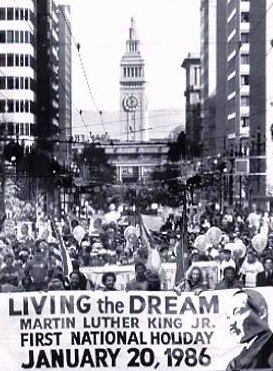

JANUARY, 2000
There are not many Americans who have a Federal holiday dedicated to their memory. Lincoln's and Washington's Days have been collapsed into a three-day "Presidents Day" shopping sales holiday. But the one American whose day remains uncommercialized and dedicated to his ideals is Martin Luther King, Jr.
In honor of this remarkable individual, Trinity University is planning a day of reflection of the man, his message, and his times. The 2000 keynote speaker will be Derrick Bell, who will appear Monday, January 17th, at 7:30 p.m. in Laurie Auditorium.
A well known and highly respected legal scholar and law
professor, Dr. Bell became Harvard
Law School's first black tenured professor in 1971. There he developed an innovative teaching style,
authored what has become a standard law school text, Race, Racism and
American Law, and was on the forefront of Critical Race Theory, which holds
that people's perspectives on events are overwhelmingly determined by their
racial background and that legal policies and precedents also bear the
influences of racism and sexism.

In
1980, he left Harvard to become Dean of the University of Oregon Law
School. Five years later he resigned his position in protest when the law
faculty there refused to offer a faculty position to an Asian-American
candidate, who had been ranked third on the list, after the first two
candidates, both white males, declined the appointment. Returning to
Harvard, he served as the Weld Professor of Law until 1992. There, once
again, he put principle above his own employment security. After refusing
to end a two-year leave taken in protest over the school's failure to hire
and tenure black women. he was dismissed by Harvard.
Professor Bell continues his campaign against institutionalized racism in novel,
non-legal. His recent books include Gospel
Choirs, Afrolantica
Legacies, and Faces
at the Bottom of the Well, the latter including a story of aliens buying
all of the blacks in America and transporting them into outer space.
![]()
"And I say to you today that I will stand by nonviolence ... And the other thing is that I am concerned about a better world. I'm concerned about justice. I'm concerned about brotherhood. I'm concerned about truth. And when one is concerned about these, he can never advocate violence. For through violence you may murder a murderer, but you can't murder murder. Through violence you may murder a liar, but you can't establish truth. Through violence you may murder a hater, but you can't murder hate. Darkness cannot put out darkness. Only light can do that."
"Injustice anywhere is a threat to justice everywhere."
"Nonviolent action, the Negro saw, was the way to supplement, not replace, the process of change. It was the way to divest himself of passivity without arraying himself in vindictive force."
"Unearned suffering is redemptive."
"I refuse to accept the cynical notion that nation after nation must spiral down a militaristic stairway into the hell of nuclear destruction. I believe that unarmed truth and unconditional love will have the final word in reality."
"I have a dream..."
"Because I have seen the mountaintop.... I may not get to the promised land with you, but I want you to know tonight that we as a people will."
![]()
![]()